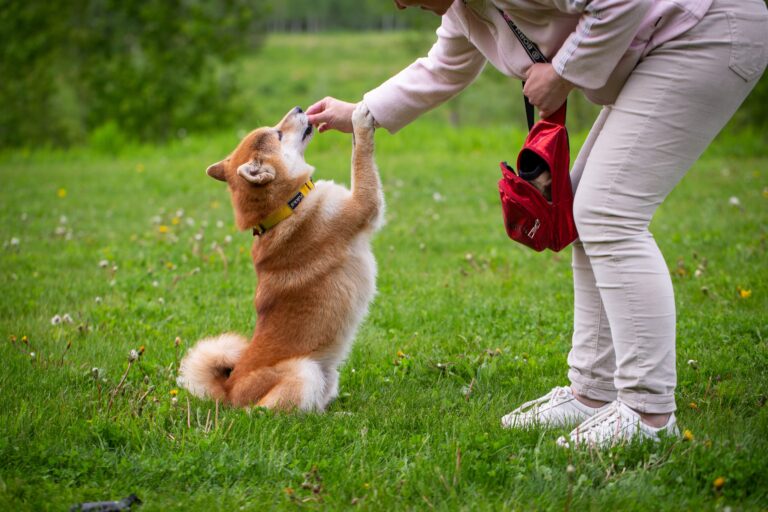How To Stop A Dog From Misbehaving

How to Stop a Dog From Misbehaving is a question that many dog owners face, especially when their furry friend starts causing chaos at home. With the right techniques and training, it’s possible to teach your dog good behavior and maintain a harmonious household. In this blog post, we’ll explore proven methods for correcting bad habits and preventing future mischief. So, let’s dive in and learn how to put an end to your dog’s misbehavior for good!
Understanding Your Dog’s Behavior
As a dog owner, it is essential to understand your pet’s behavior to train them effectively. Misbehavior is not uncommon in dogs, and it can be frustrating for pet owners. However, dogs aren’t born misbehaving; it’s something that they learn. Therefore, before you can stop your dog from misbehaving, it’s essential to understand what misbehavior is and why it happens.
Identifying Misbehavior
Misbehavior in dogs is any behavior that is unacceptable to the owner. Some of the common misbehaviors include chewing, digging, excessive barking, jumping on people, and aggression. Dogs may also show other undesirable behaviors like fear, anxiety, and restlessness.
Understanding The Causes Of Misbehavior
Misbehavior in dogs can be caused by various factors, including lack of proper training, boredom, anxiety, fear, and aggression. For instance, if a dog is not trained to behave appropriately, it will exhibit undesirable behaviors such as chewing and digging. Boredom and lack of stimulation can also lead to misbehavior in dogs. Anxiety and fear, on the other hand, can make a dog aggressive, bark excessively, and show other undesirable behaviors.
As a dog owner, it’s essential to identify the cause of your dog’s misbehavior before trying to stop it. Understanding the root cause of the behavior will help you develop an effective training strategy to correct it. Be patient, consistent, and positive in your approach.
Using positive reinforcement methods such as treats, praise, and playtime can help encourage good behavior. Remember, punishing your dog for misbehaving is not the best approach. It can lead to fear and anxiety, making the behavior worse.
Understanding your dog’s behavior will help you develop a better relationship with your pet. It will also make training easier and more effective. Remember, dogs are intelligent animals and are always willing to please their owners. With the right training and patience, you can correct any misbehavior and enjoy a happy and healthy relationship with your furry friend.
Positive Reinforcement Training
Positive reinforcement training is a proven effective method to stop a dog from misbehaving. This method focuses on rewarding good behavior rather than punishing bad behavior. It promotes a healthy relationship between you and your dog, and it can be used to teach your dog any behavior or trick you want.
Reward Good Behavior
The first step in positive reinforcement training is to identify the behavior you want to encourage and reward it. When you catch your dog doing something good, reward them with treats, praise, or affection. The reward should be immediate and consistent, so your dog knows exactly what they did right.
For example, if you want your dog to stop jumping on people, you can reward them when they greet someone calmly. You can use treats, praise, or a toy to reward them. Over time, your dog will learn that calm greetings result in rewards, and they will stop jumping on people.
Consistency Is Key
Consistency is the most important aspect of positive reinforcement training. You need to be consistent in your rewards, timing, and expectations. If you reward your dog for a behavior one day and ignore it the next, your dog will become confused and may stop trying to please you.
Set clear expectations for your dog and stick to them. If you want your dog to sit before they get a treat, make sure you always require them to sit before they get a treat. Over time, your dog will learn that sitting results in a reward.
Remember that positive reinforcement training takes time and patience. You may not see results overnight, but with consistency and patience, your dog will learn the desired behavior.
By implementing positive reinforcement training, you can stop your dog from misbehaving and strengthen your bond with them. It’s a win-win situation for both you and your furry friend.
Exercise And Mental Stimulation
Exercise and mental stimulation are two important aspects of a dog’s life that are often overlooked. In this section, we will discuss the importance of exercise and mental stimulation for dogs and how they can help stop a dog from misbehaving.
The Importance of Exercise
Exercise is crucial for a dog’s physical health and mental well-being. It helps to keep them fit, healthy, and happy. Regular exercise can also reduce a dog’s stress levels and prevent them from engaging in destructive behavior.
One way to ensure your dog gets enough exercise is to take them for daily walks. This will not only provide physical exercise but also mental stimulation as they get to explore new sights, sounds, and smells. You can also play fetch, go for a run or hike, or enroll your dog in agility training classes.
Mental Stimulation
Mental stimulation is equally important for a dog’s overall well-being. Dogs are intelligent animals and need to be mentally challenged to prevent boredom and frustration. Mental stimulation can take many forms, including interactive toys, puzzle games, and training exercises.
One of the best ways to provide mental stimulation for your dog is through training. Training sessions not only teach your dog new skills but also provide mental exercise and strengthen the bond between you and your dog. You can also engage your dog in interactive games and puzzles that require problem-solving skills.
Incorporating both exercise and mental stimulation into your dog’s daily routine can help stop them from misbehaving. Not only will it keep them physically and mentally healthy, but it will also provide an outlet for their energy and prevent them from engaging in destructive behavior. So next time you’re looking for ways to stop your dog from misbehaving, consider exercise and mental stimulation as a starting point.
Redirecting Misbehavior
As a dog owner, it’s important to redirect your dog’s misbehavior positively. Redirecting misbehavior involves guiding your dog towards more acceptable behavior and away from undesirable behavior. Here are some techniques you can use to redirect your dog’s misbehavior:
Divert Attention
One of the most effective ways to redirect your dog’s misbehavior is to divert their attention. You can do this by distracting your dog with a toy or treat. When you notice your dog engaging in undesirable behavior, quickly provide them with a toy or treat to shift their focus. This technique works best if you use high-value treats or toys that your dog loves. This will help reinforce the idea that good behavior is rewarded.
Use Of Toys And Treats
Toys and treats can be used as positive reinforcement to redirect your dog’s misbehavior. You can use toys and treats to train your dog to behave in a certain way. For example, if your dog starts barking excessively, you can redirect their attention by giving them a toy to play with. This will help to distract them from the behavior you want to discourage. Alternatively, you can use treats to reward good behavior. This will help your dog learn what behavior is acceptable and what is not.
Redirecting misbehavior requires patience and consistency. Make sure you reward good behavior and redirect your dog’s attention whenever they engage in undesirable behavior. With time, your dog will learn what behavior is acceptable and what is not. This will result in a happier, healthier relationship between you and your furry friend.
Seeking Professional Help
If you’re struggling to stop your dog from misbehaving, seeking professional help may be the best solution. Here are two options to consider: consulting a veterinarian and hiring a professional trainer.
Consulting A Veterinarian
Your first step in seeking professional help for your misbehaving dog might be to consult with a veterinarian. A veterinarian can help rule out any underlying medical issues that could be causing or contributing to your dog’s behavior. For example, if your dog suddenly starts misbehaving, it may be due to an injury or illness that needs to be addressed.
In addition, a veterinarian can recommend behavioral medications or supplements that may help improve your dog’s behavior. While medication should not be your first choice, it can be a useful tool in helping your dog overcome certain behavior problems.
Hiring A Professional Trainer
If you’ve ruled out any medical issues, your next step might be to hire a professional trainer. A professional dog trainer can provide you with the tools and knowledge you need to train your dog effectively.
When looking for a trainer, choose one who uses positive reinforcement techniques and has experience with the specific behavior problems your dog is exhibiting. A good trainer will work with you and your dog to develop a training plan that is tailored to your specific needs and goals.
Keep in mind that training takes time and patience, and results won’t happen overnight. However, with the help of a professional trainer, you can make progress and improve your dog’s behavior over time.

Conclusion
In conclusion, training a dog is an ongoing process that requires patience, consistency, and positive reinforcement. By understanding the reasons why a dog may be misbehaving, pet owners can take proactive steps to address the underlying issues. Some effective strategies include using positive reinforcement techniques, providing plenty of exercises and mental stimulation, setting clear boundaries and rules, and seeking professional help if necessary. Remember, every dog is unique, so it may take some trial and error to find the right training approach. But with time and dedication, pet owners can help their furry friends become well-behaved, happy, and healthy members of the family.
FAQ:
If you’re a dog owner, you might experience misbehavior from your furry friend. This can be frustrating, but the good news is that it’s not uncommon. Here are some frequently asked questions about how to stop a dog from misbehaving:
What Causes Misbehavior In Dogs?
There are many reasons why a dog might misbehave. Some of the most common causes include boredom, a lack of exercise, anxiety, and a lack of training. It’s important to identify the root cause of your dog’s misbehavior so that you can address it properly.
How Can I Stop My Dog From Barking All The Time?
Barking is a natural behavior for dogs, but excessive barking can be problematic. To stop your dog from barking all the time, try to identify the cause of their barking. Is your dog bored? Do they need more exercise? Are they anxious? Once you’ve identified the cause, you can address it. You can also try training your dog to be quiet on command and rewarding them when they are quiet.
How Can I Stop My Dog From Jumping Up On People?
Jumping up on people is a common behavior for dogs, but it can be annoying and even dangerous. To stop your dog from jumping up on people, you can try turning your back on them when they jump up and only giving them attention when they are calm and have all four paws on the ground. You can also train your dog to sit or stay when people come to visit.
How Can I Stop My Dog From Chewing Everything?
Dogs love to chew, but when they start chewing on everything in sight, it can be frustrating. To stop your dog from chewing everything, make sure they have plenty of appropriate chew toys. You can also try using a bitter spray on items you don’t want your dog to chew on and providing plenty of exercise and mental stimulation.
Remember, every dog is different, and what works for one dog might not work for another. Be patient and persistent, and you’ll be able to stop your dog from misbehaving.







